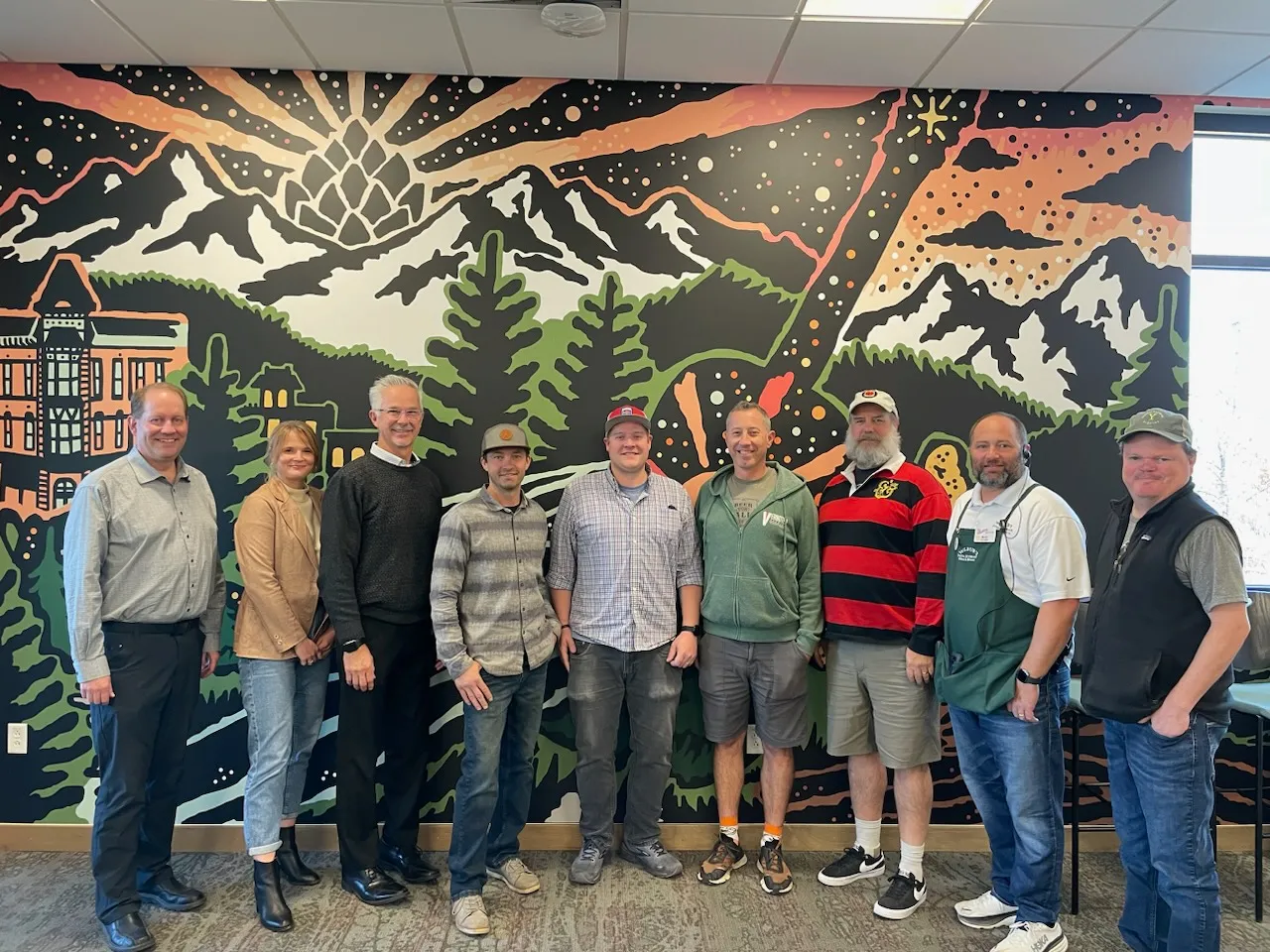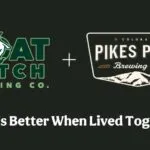CEO Roundtable: Region’s brewers, liquor stores squeezed

FORT COLLINS — Higher prices, shifting laws and evolving consumer tastes have mixed to create a challenging climate for breweries, bars and liquor stores, Northern Colorado industry leaders said Tuesday at a BizWest CEO Roundtable on brewing held in the downtown Fort Collins offices of Elevations Credit Union.
“We all have similar headaches, whether you’re distilling or brewing or retailing it,” said Mat Dinsmore, owner of Wilbur’s Total Beverage in Fort Collins and Wyatt’s Wet Goods in Longmont, who said the industry has had to face “the changing in laws, the changing in consumer behaviors.
“I love what I get to do, like you guys do. None of us are getting rich or famous doing this, but we had a hell of a lot of fun,” Dinsmore said. “The last couple years, the fun is gone, and it’s made it really hard, and I can’t look my kids in the eye and say. ‘This is a great industry to come into once you’re done with high school or college.’”
SPONSORED CONTENT
Tim Cochran, who co-owns Horse and Dragon Brewing Co. along with his wife, Carol, noted that those issues are “top of mind for us. How do we make it work in Northern Colorado given the economic trends? We talk about housing expenses and the livable wage; we hear that a lot. We try to achieve that. But those things seem to be further and further apart.
“We want to take care of our people. We always want to pay above industry standard and above averages so people can live in this great community,” he said. “Walking that line between making sure our people are taken care of and can live and work in the neighborhood – this year it seems just a little bit tighter to make that happen.”
Ben Harmelink, owner of High Brau Taphouse in Greeley, recalled that “when I first moved out here about a dozen years ago, I was very impressed with how much small-business support there was, at both the local and state level, and it seems that over the last decade or so there’s been a trend of going more and more away from protecting the independent small businessman and going toward the big corporations, the multi-location stores.
“Liquor stores got hit with a triple whammy — getting rid of the one-location, one-license law, allowing beer and now wine into gas stations and grocery stores,” he said. “I’m just worried for all these local locations that were able to compete because they had their own little area, and now it’s going to be a lot more of a struggle.”
Daniel Yetter just bought a new building in Greeley for his Yetters Brewing Co. and acknowledged the pain of “constantly higher prices and the cost of production. “I just got out of a conference where we talked about the overabundance of hops, like 40 million pounds of hops, and yet we’re still watching hop prices go up and up.
“I hate charging $7 a beer. When I was in college, you could find a beer for three, four bucks, and I could do it.” Now, Yetter said, he talks to students at the University of Northern Colorado, “and they’re telling me, “We just can’t do that. We can’t go out and have two beers.’”
Josh Grenz, owner of Verboten Brewing in Loveland, wondered, “How do we re-engage and keep it fun for people? There will be a cap to how much we can charge for beer or people will stop buying it.”
Still, he said, it could be worse. “I was just in Chicago last week and most beers there are $9, $10 everywhere you go. That seemed brutal.
“Will we get to that point here. where we have to do that and see where it goes, or do we just not do it and try to figure out how to save money on the back end, like cutting the ability to use local ingredients; they’re harder to source and more expensive. We don’t really want to do that,” Grenz said. “At what point do we say we can’t raise our prices any more and figure out where to cut. We don’t want to do that with people. Leases still go up. Costs are still going up on everything. So where do you save money on the back end? That’s where it gets kind of scary.”
Cochran said his wife told him about a notice she got from the company that provides insurance for Horse and Dragon’s manufacturing facility. The letter was headlined, “Good news,” she said, “and it said our insurance price is only going up by 11% this year. That was after last year when we only had a 12½% increase.
“So she wrote back to them very pointedly and then called them and said, ‘Please don’t ever say that to anybody who’s running a small business, or any business, that it’s ‘only’ going up by more than 10% and that that’s ‘good news.’
“If we raised our pricing 10% a year from what we started,” Cochran said, “we’d be charging $23 a pint, and that’s a little bit untenable. In fact, impossible, right? Even at $7, it’s still a push. The elasticity of pricing of pints across the bar is really, really difficult. It’s the same at the liquor-store level with a six-pack.”
Price spikes haven’t impacted Fort Collins-based Seed and Spirit Distilling as greatly as it has the beermakers, said Joel Gustafson, its founder and chief distiller.
“We produce everything 100% in house. We developed an in-house malting system and we just harvested our first six acres of grain. The difference in our product is that mine doesn’t expire,” he said. “As a startup, our challenge is bridging the gap between keeping employees working and trying to get on the market and making money for your business.”
To survive, Grenz said, “We’re trying to figure out how to diversify products and stay sustainable in the long term.”
A key to that, he said, is “being adaptable to styles and trends. People’s palates have changed. Younger generations like sweeter stuff. People raised on McDonald’s want sweet. Not everybody likes bitter. Not everybody likes sour. Everybody likes sweet, in the U.S. especially.
“The ‘bitter wars’ of old had the brewers trying to outdo each other for a little bit, and then they were like, ‘What are we doing? People don’t actually like these.’”
“The vast majority of people don’t want to taste the liquor by itself,” added Harmelink. “They want to use it as a mixer in a cocktail. It’s kind of a shame, because I’m paying a little bit more to get a higher-quality product, and if you just put Coke in it, what’s the difference?”
Dinsmore agreed that many budget-conscious customers are “drinking down,” putting quantity over quality, and contended that “millennials aren’t drinking as much.
“We all got a boost with COVID because nobody did anything but drink for two years,” he said. “And now we’re having to pay the piper because some people said, ‘Maybe I shouldn’t behave this way.’”
Although Cochran speculated that “we’re probably in the middle of a health trend,” Dinsmore wondered whether some alcohol consumers’ habits have changed because of the legalization of recreational marijuana and mushrooms. “For the first time ever,” he said, “we have a legal competitor.”
Harmelink said he tracks Colorado brewery openings and closures every month. “In the last six months, we’ve lost more breweries than we lost in the past two years combined,” he said. “From September to now, we lost eight breweries and gained seven, and 75% of the breweries that have opened have been in the graveyard of a former brewery. Very few new builds.”
Perhaps the hardest hit, the panelists agreed, has come from new rules that expanded beer and then wine sales to grocery and convenience stores. That made small craft brewers’ access to the market more difficult, Cochran said, because “the chains aren’t going to talk to you.
“A hundred years of roles got turned on their head overnight,” he said.
Before the laws were loosened, Dinsmore said, Wilbur’s and Wyatt’s sales were 25% beer, 25% spirits and 50% wine. Afterwards, he said, “we watched that share shrink.
“When beer went into grocery stores, I don’t think it did anybody in this room a lot of good,” he said. “For us, 2019 was a nightmare.”
“Wine hit those smaller stores harder than beer,” Cochran added.
“The liquor-store situation in Loveland is pretty volatile, with layoffs, ownership changes, stores for sale,” Grenz said. “Some of the pretty stable liquor stores that are some of our best customers are changing ownership and downsizing and firing management.”
Existing breweries, at least for now, shouldn’t expect the exponential growth they experienced before the pandemic, Grenz said.
“Flat is the new growth in brewing. If you’re flat, you’re good,” Grenz said. “It’s hard to wrap your brain around that.”
The CEO Roundtable was attended by sponsors Mike Grell, a partner at Plante Moran; Darin Atteberry, Northern Colorado market president for Elevations Credit Union; and Ashley Cawthorn, director of marketing for Berg Hill Greenleaf Ruscitti LLP.
FORT COLLINS — Higher prices, shifting laws and evolving consumer tastes have mixed to create a challenging climate for breweries, bars and liquor stores, Northern Colorado industry leaders said Tuesday at a BizWest CEO Roundtable on brewing held in the downtown Fort Collins offices of Elevations Credit Union.
“We all have similar headaches, whether you’re distilling or brewing or retailing it,” said Mat Dinsmore, owner of Wilbur’s Total Beverage in Fort Collins and Wyatt’s Wet Goods in Longmont, who said the industry has had to face “the changing in laws, the changing in consumer behaviors.
“I love what I get to do,…





